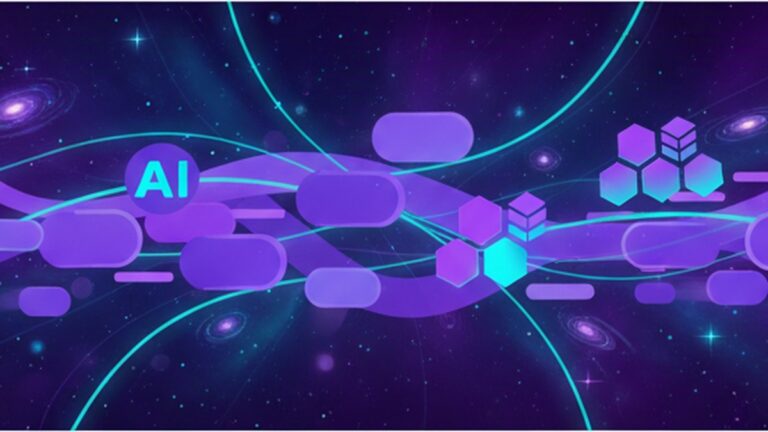In an era where digital assets are reshaping financial landscapes, the fusion of blockchain analytics and artificial intelligence (AI) is emerging as a game-changer. As of September 26, 2025, this evolution is not just a trend; it’s a necessity that’s redefining how we interpret and interact with blockchain technology. By turning raw on-chain data into actionable insights, AI-powered analytics are providing invaluable tools for investors, law enforcement, and everyday users.
The Rise of AI in Blockchain Analytics
Blockchain technology, by its nature, generates vast amounts of data. Blockchains are decentralized, meaning every transaction, smart contract, and digital interaction is recorded on a public ledger. While this transparency is one of blockchain’s strongest assets, the sheer volume and complexity of data can be overwhelming. Enter AI—a catalyst that transforms this raw data into something digestible and practical.
AI algorithms are adept at detecting patterns, predicting trends, and identifying anomalies. For investors, this means having the power to anticipate market shifts or spot emerging opportunities with greater accuracy. For example, AI can analyze historical transaction data to forecast price movements of cryptocurrencies, giving traders a competitive edge. In a market where timing is everything, the ability to predict the next Bitcoin surge or the sudden rise of an altcoin can be a game changer.
Enhancing Security and Compliance
Beyond investment strategies, AI-powered blockchain analytics are proving indispensable in enhancing security and compliance. With the rise of decentralized finance (DeFi) and the increasing volume of cryptocurrency transactions, the risk of fraud and money laundering is a growing concern. AI steps in as a watchdog, monitoring transactions for suspicious activity. It can quickly flag patterns synonymous with illicit behavior, helping law enforcement agencies to thwart potential threats before they escalate.
For instance, AI can track down wallet addresses associated with known criminal activities and link seemingly unrelated transactions. This capability not only aids in apprehending cybercriminals but also in building stronger cases in court by providing a digital trail of evidence. Furthermore, financial institutions are leveraging AI to ensure compliance with international regulations, avoiding hefty fines and reputational damage.
Everyday Benefits for Users
But it’s not just the big players who stand to gain from AI-powered blockchain analytics. Everyday users can also benefit significantly. With AI, understanding and participating in the blockchain ecosystem becomes more accessible. For those new to the world of cryptocurrencies, AI-driven platforms can offer personalized insights and educational resources tailored to individual investment goals and risk appetites.
Consider a novice investor interested in Ethereum. An AI-powered tool can provide a comprehensive overview of the current market conditions, historical price data, and potential future trends, all while factoring in the user’s personal financial situation. This level of detail and personalization democratizes access to information, empowering more people to participate in the blockchain revolution with confidence.
Balancing the Benefits and Risks
While the integration of AI and blockchain analytics brings numerous advantages, it’s not without its challenges. One major concern is privacy. The ability of AI to sift through vast amounts of data raises questions about how user information is handled and protected. As AI becomes more sophisticated, ensuring that personal data isn’t misused or mishandled is paramount.
Moreover, the reliance on AI systems introduces the risk of algorithmic bias. If AI models are trained on skewed data, they may produce biased results, leading to unfair practices or incorrect analyses. This is particularly concerning in law enforcement applications, where bias can have serious legal and ethical implications.
Thus, it’s crucial for developers and stakeholders to implement rigorous testing and oversight to ensure AI systems are both fair and transparent. Collaboration between technologists, policymakers, and ethicists is necessary to create frameworks that protect user rights while fostering innovation.
The Future of AI-Powered Blockchain
Looking ahead, the marriage of AI and blockchain analytics is poised to unlock even more possibilities. As AI technology continues to evolve, we can expect even greater precision and efficiency in data analysis, leading to more informed decision-making across all sectors. For investors, this means smarter portfolios; for law enforcement, quicker and more accurate criminal investigations; and for everyday users, a deeper understanding and engagement with blockchain technology.
The potential for AI to enhance blockchain analytics is vast, and while challenges remain, the benefits far outweigh the drawbacks. As we stand on the threshold of this new era, it’s clear that AI-driven insights are not just enhancing blockchain analytics—they’re transforming them. Embracing this change will be key for anyone looking to stay ahead in the rapidly evolving world of digital finance.

Steve Gregory is a lawyer in the United States who specializes in licensing for cryptocurrency companies and products. Steve began his career as an attorney in 2015 but made the switch to working in cryptocurrency full time shortly after joining the original team at Gemini Trust Company, an early cryptocurrency exchange based in New York City. Steve then joined CEX.io and was able to launch their regulated US-based cryptocurrency. Steve then went on to become the CEO at currency.com when he ran for four years and was able to lead currency.com to being fully acquired in 2025.


